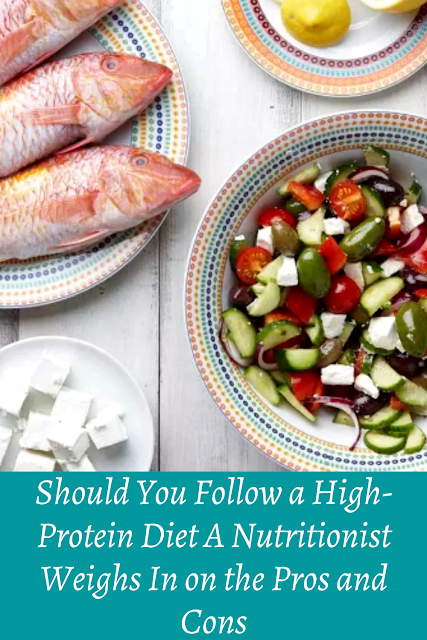The way we think about the word “diet” today is something borne of restriction that helps you lose weight. The Mediterranean diet couldn’t be further from that. Rather, it’s a heart-healthy diet that includes the food staples of people who live in the region around the Mediterranean Sea, such as Greece, Croatia, and Italy.
You’ll find that in their meals, they emphasize a plant-based eating approach, loaded with vegetables and healthy fats, including olive oil and omega-3 fatty acids from fish. It’s a diet known for being heart-healthy.
"This diet is rich in fruits and vegetables, whole grains, seafood, nuts and legumes, and olive oil," says Nancy L. Cohen, PhD, RD, professor of nutrition at the University of Massachusetts in Amherst. On this plan, you’ll limit or avoid red meat, sugary foods, and dairy (though small amounts like yogurt and cheese are allowed).
Eating this way means you also have little room for processed fare. When you look at a plate, it should be bursting with color; traditional proteins like chicken may be more of a side dish compared with the produce packing the plate.
One thing you’ll find people love about the Mediterranean diet is the allowance of moderate amounts of red wine. “Moderate” means 5 ounces (oz) or less each day for women (one glass) and no more than 10 oz daily for men (two glasses). Above all else, these meals are eaten in the company of friends and family; strong social ties are a cornerstone of healthful lives — and a healthful diet. Here, food is celebrated.
A Mediterranean Sample Menu for 1 Week
Below is a sample menu for one week on the Mediterranean diet.
Feel free to adjust the portions and food choices based on your own needs and preferences.
1. Monday
- Breakfast: Greek yogurt with strawberries and oats.
- Lunch: Whole-grain sandwich with vegetables.
- Dinner: A tuna salad, dressed in olive oil. A piece of fruit for dessert.
2. Tuesday
- Breakfast: Oatmeal with raisins.
- Lunch: Leftover tuna salad from the night before.
- Dinner: Salad with tomatoes, olives and feta cheese.
3. Wednesday
- Breakfast: Omelet with veggies, tomatoes and onions. A piece of fruit.
- Lunch: Whole-grain sandwich, with cheese and fresh vegetables.
- Dinner: Mediterranean lasagne.
4. Thursday
- Breakfast: Yogurt with sliced fruits and nuts.
- Lunch: Leftover lasagne from the night before.
- Dinner: Broiled salmon, served with brown rice and vegetables.
5. Friday
- Breakfast: Eggs and vegetables, fried in olive oil.
- Lunch: Greek yogurt with strawberries, oats and nuts.
- Dinner: Grilled lamb, with salad and baked potato.
6. Saturday
- Breakfast: Oatmeal with raisins, nuts and an apple.
- Lunch: Whole-grain sandwich with vegetables.
- Dinner: Mediterranean pizza made with whole wheat, topped with cheese, vegetables and olives.
7. Sunday
- Breakfast: Omelet with veggies and olives.
- Lunch: Leftover pizza from the night before.
- Dinner: Grilled chicken, with vegetables and a potato. Fruit for dessert.
There is usually no need to count calories or track macronutrients (protein, fat and carbs) on the Mediterranean diet.
Healthy Mediterranean Snacks
You don't need to eat more than 3 meals per day.
But if you become hungry between meals, there are plenty of healthy snack options:
- A handful of nuts.
- A piece of fruit.
- Carrots or baby carrots.
- Some berries or grapes.
- Leftovers from the night before.
- Greek yogurt.
- Apple slices with almond butter.
How to Follow the Diet at Restaurants
It’s very simple to make most restaurant meals suitable for the Mediterranean diet.
- Choose fish or seafood as your main dish.
- Ask them to fry your food in extra virgin olive oil.
- Only eat whole-grain bread, with olive oil instead of butter.
Health benefits
The Mediterranean diet receives a lot of attention from the medical community because many studies verify its benefits.
The benefits of a Mediterranean diet include:
Lowering the risk of cardiovascular disease
Evidence suggests that a Mediterranean diet may reduce the risk of cardiovascular disease. A study that featured in The New England Journal of Medicine compared two Mediterranean diets with a control diet for almost 5 years.
The research suggested that the diet reduced the risk of cardiovascular issues, including stroke, heart attack, and death, by about 30 percent compared with the control group.
More studies are necessary to determine whether lifestyle factors, such as more physical activity and extended social support systems, are partly responsible for the lower incidence of heart disease in Mediterranean countries than in the United States.
Improving sleep quality
In a 2018 study, researchers explored how the Mediterranean diet affects sleep.
Their research suggested that adhering to a Mediterranean diet may improve sleep quality in older adults. The diet did not seem to affect sleep quality in younger people.
Weight loss
The Mediterranean diet may also be helpful for people who are trying to lose weight.
The authors of a 2016 review noted that people who were overweight or had obesity lost more weight on the Mediterranean diet than on a low-fat diet. The Mediterranean diet group achieved results that were similar to those of the participants on other standard weight loss diets.
